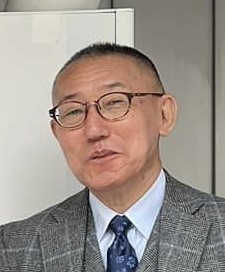 I am IZUMI Kaoru, a member of the Law School, and I have been appointed as the director of the Center since April 2024. My research focuses on party politics and elections in Korea, as well as municipal and constituency politics in Japan.
I am IZUMI Kaoru, a member of the Law School, and I have been appointed as the director of the Center since April 2024. My research focuses on party politics and elections in Korea, as well as municipal and constituency politics in Japan.
The Center for Korean Studies at Kyushu University was established as an intramural organization at the end of 1999, and in April 2002 became an “intramural joint educational research facility” under the Ministry of Education, Culture, Sports, Science and Technology Ordinance No. 28. I have been involved with the Center since its preparatory stage as an intramural organization. I am the only participant from the preparatory stage who is still working at Kyushu University. In other words, the Center is now approaching a point where a generational change and next stage of development are required, on top of a quarter of a century of achievements.
Looking back at the most recent period, the Center’s relocation to the Ito Campus and its environmental improvements were carried out under the leadership of former Center Director FUKAGAWA Hiroshi. Under former Director MOTOKANE Masahiro, the Center’s holdings were transferred to the library, digitized, and reorganized. Building on the achievements of the previous directors, I would like to take on the challenge of making the transition to a sustainable center that can be passed on to the next generation. I would also like to reaffirm the center’s position as a center that supports regional research as “comprehensive knowledge” and establish it with new research achievements.
Our university aims to be “a university that drives social change through comprehensive knowledge. Although often misunderstood, the Center for Korean Studies is not an organization that researches only “Korea” (Republic of Korea). The Center’s English name is Research Center for Korean Studies. In other words, the Center is an organization that promotes Korean Studies as an area study. In formulating this English name, the Center was conscious of the “Korean-speaking world,” which encompasses not only the governments of both North and South Korea, but also groups originating from the Korean Peninsula, such as the Zainichi and Koryo people. Since its establishment, the Center has positioned Korean Studies as an area study to study this region. Therefore, it can be said that since its inception, the Center has been seeking and pursuing cross-disciplinary “comprehensive knowledge” that transcends the individual specialized fields of the humanities and social sciences.
However, it is undeniable that the center’s main focus has been on research that deals with the Korean-speaking world, i.e., research that “targets” the Korean-speaking world. However, as Korea has become a “developed country” and bilateral relations between Japan and Korea have shifted to a more horizontal and pluralistic relationship, it will be necessary to actively engage in research “with” or “in” the Korean-speaking countries, i.e., research that faces the same subject together in a neighboring country. For example, we need to promote joint research to address common issues such as population contraction and super-aging, climate change, and marine pollution such as marine debris. Therefore, we have already begun to expand the Center’s faculty in “science” departments, with a view to further developing into comprehensive knowledge that goes beyond the so-called “humanities and sciences.
In addition, as the only Japanese member of the World Consortium for Korean Studies, which includes Harvard University, University of London, and Seoul National University, we will continue to actively promote our research globally. In addition, we will expand our domestic and international collaborative research network by utilizing external funding from the Korea Foundation and other sources.
As mentioned above, based on the achievements of the past quarter century, we look forward to your further support and cooperation for the Center for Korean Studies as we pursue further development.

